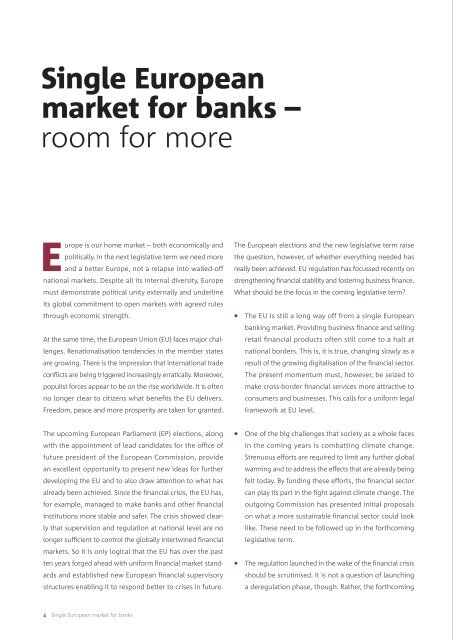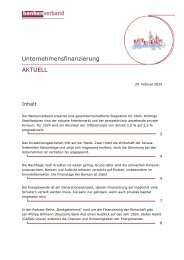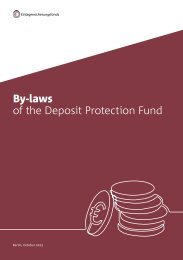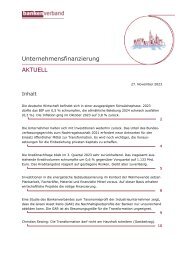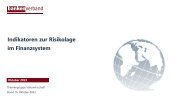Moving Europe forward - a strong single market for citizens, businesses and banks
Europe is our home market – both economically and politically. In the next legislative term we need more and a better Europe, not a relapse into walled-off national markets. Despite all its internal diversity, Europe must demonstrate political unity externally and underline its global commitment to open markets with agreed rules through economic strength.
Europe is our home market – both economically and politically. In the next legislative term we need more and a better Europe, not a relapse into walled-off national markets. Despite all its internal diversity, Europe must demonstrate political unity externally and underline its global commitment to open markets with agreed rules through economic strength.
Create successful ePaper yourself
Turn your PDF publications into a flip-book with our unique Google optimized e-Paper software.
Single <<strong>strong</strong>>Europe</<strong>strong</strong>>an<br />
<strong>market</strong> <strong>for</strong> <strong>banks</strong> –<br />
room <strong>for</strong> more<br />
<<strong>strong</strong>>Europe</<strong>strong</strong>> is our home <strong>market</strong> – both economically <strong>and</strong><br />
politically. In the next legislative term we need more<br />
<strong>and</strong> a better <<strong>strong</strong>>Europe</<strong>strong</strong>>, not a relapse into walled-off<br />
national <strong>market</strong>s. Despite all its internal diversity, <<strong>strong</strong>>Europe</<strong>strong</strong>><br />
must demonstrate political unity externally <strong>and</strong> underline<br />
its global commitment to open <strong>market</strong>s with agreed rules<br />
through economic strength.<br />
At the same time, the <<strong>strong</strong>>Europe</<strong>strong</strong>>an Union (EU) faces major challenges.<br />
Renationalisation tendencies in the member states<br />
are growing. There is the impression that international trade<br />
conflicts are being triggered increasingly erratically. Moreover,<br />
populist <strong>for</strong>ces appear to be on the rise worldwide. It is often<br />
no longer clear to <strong>citizens</strong> what benefits the EU delivers.<br />
Freedom, peace <strong>and</strong> more prosperity are taken <strong>for</strong> granted.<br />
The <<strong>strong</strong>>Europe</<strong>strong</strong>>an elections <strong>and</strong> the new legislative term raise<br />
the question, however, of whether everything needed has<br />
really been achieved. EU regulation has focussed recently on<br />
strengthening financial stability <strong>and</strong> fostering business finance.<br />
What should be the focus in the coming legislative term?<br />
• The EU is still a long way off from a <strong>single</strong> <<strong>strong</strong>>Europe</<strong>strong</strong>>an<br />
banking <strong>market</strong>. Providing business finance <strong>and</strong> selling<br />
retail financial products often still come to a halt at<br />
national borders. This is, it is true, changing slowly as a<br />
result of the growing digitalisation of the financial sector.<br />
The present momentum must, however, be seized to<br />
make cross-border financial services more attractive to<br />
consumers <strong>and</strong> <strong>businesses</strong>. This calls <strong>for</strong> a uni<strong>for</strong>m legal<br />
framework at EU level.<br />
The upcoming <<strong>strong</strong>>Europe</<strong>strong</strong>>an Parliament (EP) elections, along<br />
with the appointment of lead c<strong>and</strong>idates <strong>for</strong> the office of<br />
future president of the <<strong>strong</strong>>Europe</<strong>strong</strong>>an Commission, provide<br />
an excellent opportunity to present new ideas <strong>for</strong> further<br />
developing the EU <strong>and</strong> to also draw attention to what has<br />
already been achieved. Since the financial crisis, the EU has,<br />
<strong>for</strong> example, managed to make <strong>banks</strong> <strong>and</strong> other financial<br />
institutions more stable <strong>and</strong> safer. The crisis showed clearly<br />
that supervision <strong>and</strong> regulation at national level are no<br />
longer sufficient to control the globally intertwined financial<br />
<strong>market</strong>s. So it is only logical that the EU has over the past<br />
ten years <strong>for</strong>ged ahead with uni<strong>for</strong>m financial <strong>market</strong> st<strong>and</strong>ards<br />
<strong>and</strong> established new <<strong>strong</strong>>Europe</<strong>strong</strong>>an financial supervisory<br />
structures enabling it to respond better to crises in future.<br />
• One of the big challenges that society as a whole faces<br />
in the coming years is combatting climate change.<br />
Strenuous ef<strong>for</strong>ts are required to limit any further global<br />
warming <strong>and</strong> to address the effects that are already being<br />
felt today. By funding these ef<strong>for</strong>ts, the financial sector<br />
can play its part in the fight against climate change. The<br />
outgoing Commission has presented initial proposals<br />
on what a more sustainable financial sector could look<br />
like. These need to be followed up in the <strong>for</strong>thcoming<br />
legislative term.<br />
• The regulation launched in the wake of the financial crisis<br />
should be scrutinised. It is not a question of launching<br />
a deregulation phase, though. Rather, the <strong>for</strong>thcoming<br />
4 Single <<strong>strong</strong>>Europe</<strong>strong</strong>>an <strong>market</strong> <strong>for</strong> <strong>banks</strong>


